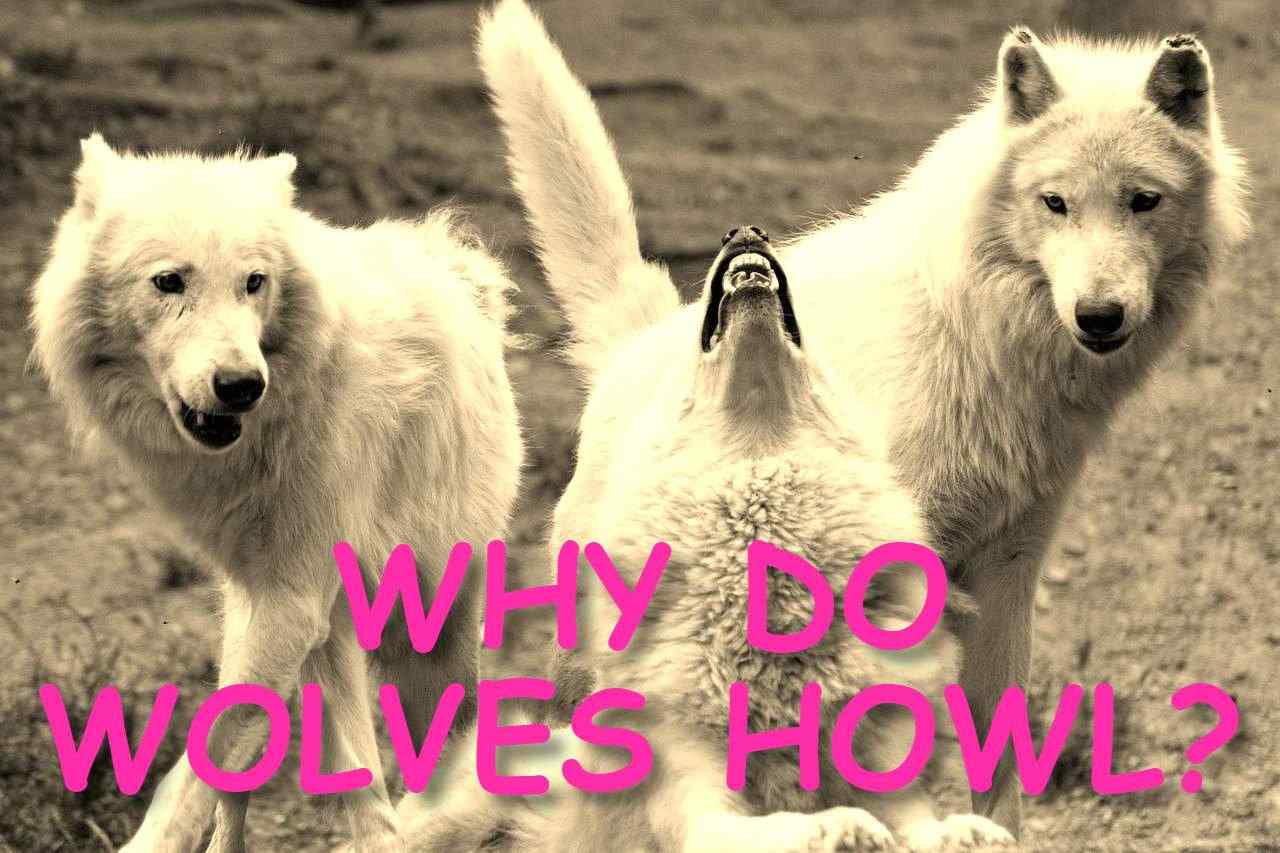Table of Contents
Have you ever heard a wolf howl and wondered why they do it? Like many animals, wolves have their own way of communicating, and howling is one of them. In this article, we’ll explore the reasons why wolves howl, their behavior at night, and how they use howling to communicate with each other.
What is Howling and Why Do Wolves Do It?
Definition of Howling
Howling is a type of vocalization that wolves and other canids use to communicate. It’s a long, high-pitched sound that can be heard over long distances, up to 10 miles away. Wolves can produce different types of howls, such as chorus howls, lone howls, and whimpering howls.
Reasons Why Wolves Howl
There are several reasons why wolves howl. One of the main reasons is to communicate with other pack members. Howling can be heard over long distances, and it’s a way for wolves to signal to other pack members where they are located. It’s also used as a distress call; if a wolf is in trouble, they may howl to alert their pack members.
Wolves also howl to bond with their pack members. Howling together is a way for the pack to strengthen their social bonds and reaffirm their group identity. Additionally, wolves howl to mark their territory and warn other wolves to stay away.
How Wolves Howl
When a wolf howls, they tilt their head back and open their mouth wide. They then produce a long, drawn-out sound that varies in pitch and duration. The howling can last anywhere from a few seconds to several minutes, depending on the situation.
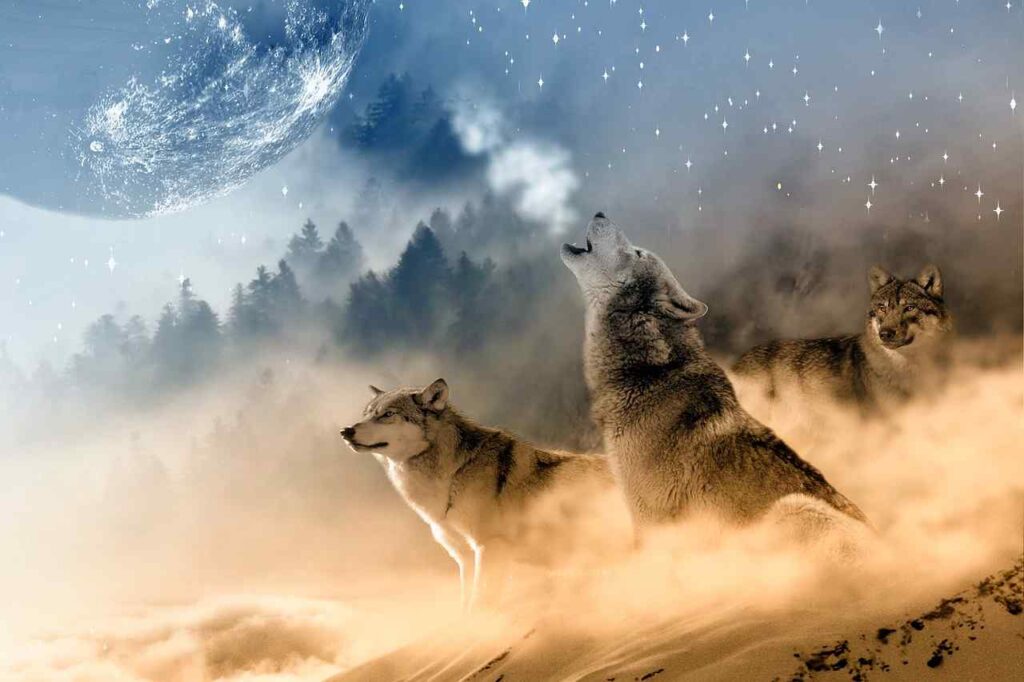
Do Wolves Really Howl at the Moon?
Origins of the Myth
The idea that wolves howl at the moon is a common myth, but it’s not entirely accurate. The myth likely originated from the fact that wolves tend to howl at night when the moon is out, but they aren’t actually howling at the moon itself.
Wolves' Behavior at Night
Wolves are nocturnal animals, which means they are active at night. They use the cover of darkness to hunt prey and move around without being detected. Howling at night is a way for wolves to communicate with other pack members when they are not within visual range. In addition to howling, wolves also use vocalizations such as barks, whines, and growls to communicate.
Other Reasons for Howling
While communication is the primary reason why wolves howl, there are other reasons why they may howl. Sometimes, wolves will howl as a means of attracting a mate. Male wolves may also howl to show their dominance over other males.
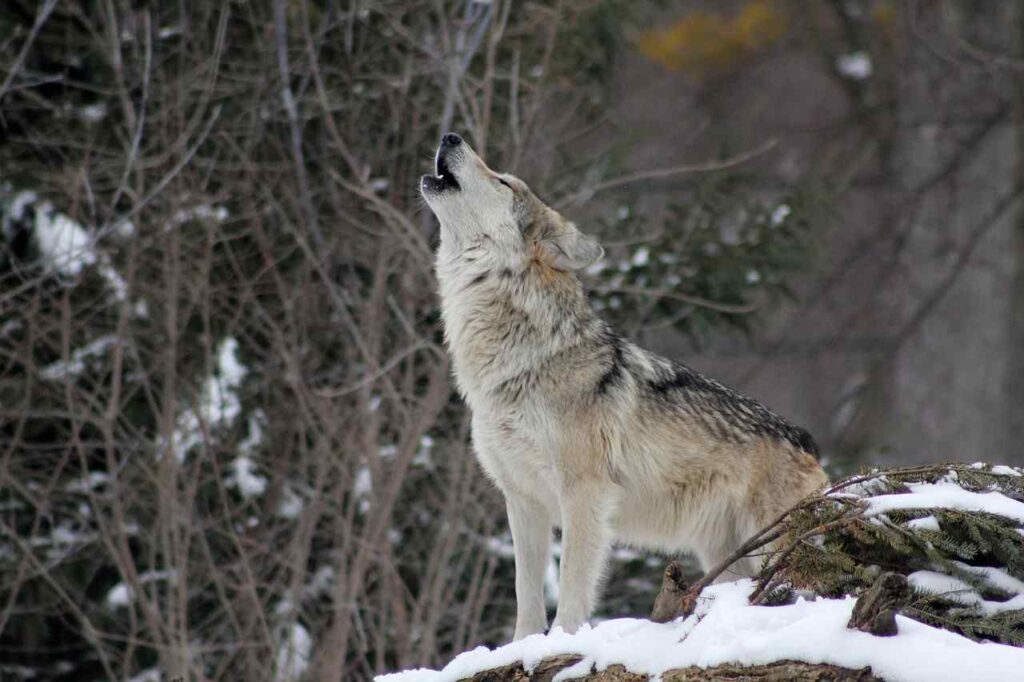
How Do Wolves Communicate Through Howling?
Location Communication
One of the primary ways that wolves use howling to communicate is by signaling their location to other pack members. When a wolf howls, the sound can travel up to 10 miles away, depending on the terrain. By howling together, pack members can locate each other more easily and quickly.
Howling as a Distress Call
Wolves also use howling as a distress call. If a wolf is injured or in trouble, they may howl to alert their pack members. The pack can then come to the injured wolf's aid, providing protection and support.
Howling as a Pack Bonding Activity
Finally, wolves use howling as a way to bond with each other. Howling together is an activity that strengthens social bonds and reinforces the pack's identity. This type of howling is usually done for no specific reason and is simply a way for the wolves to come together as a group.
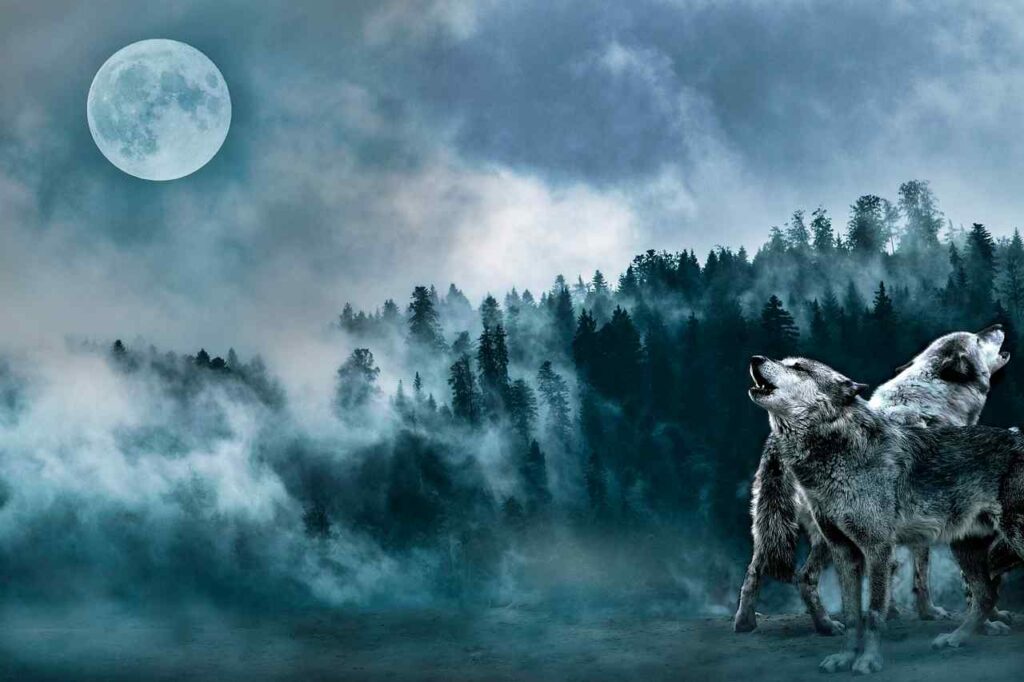
Ever Wondered What Other Sounds Wolves Make?
Barks and Pups
While howling is the most well-known sound that wolves make, they also produce other vocalizations. For example, wolves use barks to communicate with each other when they are close together. They also make high-pitched whines and growls when communicating with their pups.
Growls and Snarls
Wolves also use growls and snarls when communicating with other wolves. These vocalizations are often used to show dominance or aggression towards other wolves or animals that the pack sees as a threat.
Other Vocalizations
In addition to barks, whines, growls, and snarls, wolves use other types of vocalizations to communicate. For example, they may make a low-pitched rumble to show affection towards another wolf or a human.
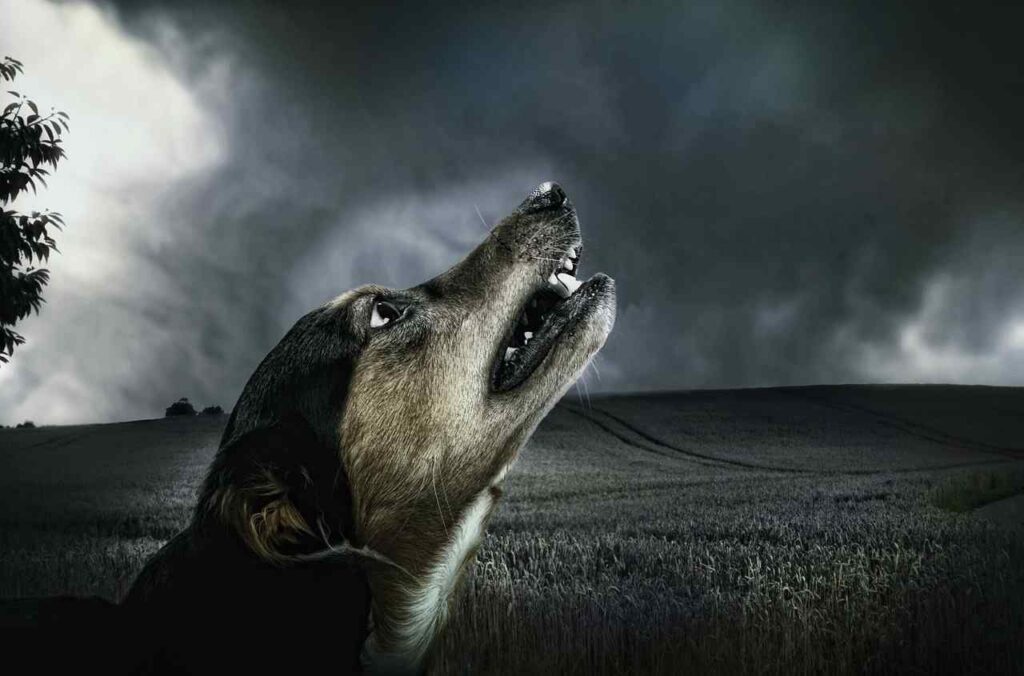
Conclusion
Wolves and their Importance in the Ecosystem
Wolves play an important role in the ecosystems in which they live. They help to control populations of prey animals, which in turn helps to maintain ecological balance. They also play a role in shaping the behavior and distribution of other wildlife species.
Conservation and Protection Efforts
Unfortunately, wolves face many threats to their survival, including hunting, habitat loss, and disease. Conservation and protection efforts are necessary to ensure that wolves remain a vital part of our ecosystems for generations to come.
In conclusion, wolves howl for many reasons, primarily to communicate with other pack members. They use howling to locate each other, bond with each other, and signal danger or distress. While howling is the most well-known sound that wolves make, they also produce other vocalizations that are important for communication with each other and shaping their behavior within their ecosystems.
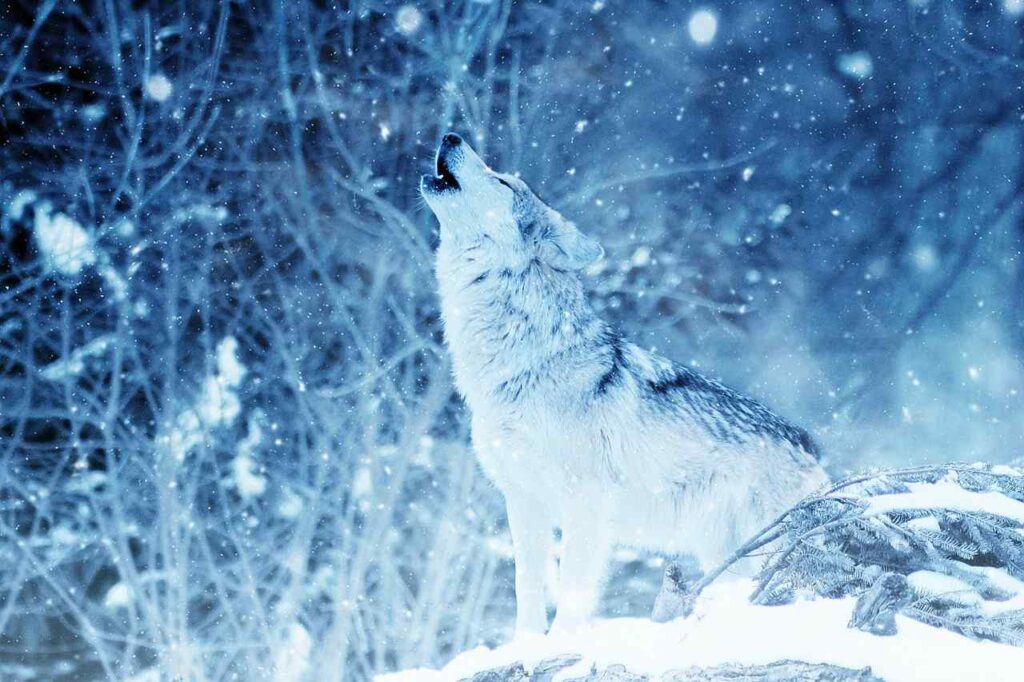
Frequently Asked Questions About Why Do Wolves Howl
Q: Why do wolves howl?
A: Wolves howl to communicate with other members of their pack. They also howl to find each other over long distances, establish territory, and signal potential prey or danger to other wolves.
Q: Do wolves howl at night?
A: Yes, wolves primarily howl at night. This is because they are nocturnal animals and are more active during the nighttime hours.
Q: Do lone wolves howl?
A: Yes, lone wolves also howl. They use their howl as a way to communicate with other wolves and to potentially find a mate and join a pack.
Q: Do wolves only howl at the moon?
A: No, despite popular belief, wolves do not only howl at the moon. In fact, wolves will use howling to communicate with each other regardless of the moon's visibility.
Q: Can wolves bark as well as howl?
A: Yes, wolves can bark as well as howl. However, they tend to use barking more as a warning or alarm call than as a means of communication within their pack.
Q: Do all wolves in a pack howl?
A: No, not all wolves in a pack will necessarily howl. Usually, only the alpha pair of wolves will initiate the howling, and other members of the pack will join in as they see fit.
Q: Do gray wolves howl differently than other types of wolves?
A: No, gray wolves howl in much the same way as other types of wolves. However, the pitch and tone of a wolf's howl can vary depending on factors such as their age, gender, and individual characteristics.
Q: Is howling the only way that wolves communicate with each other?
A: No, wolves communicate with each other in a variety of ways, including through body language, vocalizations other than howling (such as growling or whimpering), and scent marking.
Q: Do wolves howl more during the breeding season?
A: Yes, wolves tend to howl more frequently during the breeding season. This is because the alpha pair of wolves may howl as a way to signal to the rest of the pack that they are preparing to breed.
Q: Can wolves harmonize when they howl together?
A: Yes, wolves are able to harmonize their howls when they howl together as a pack. This creates a haunting and eerie sound that can be heard over long distances.
Q: Do wolves only howl at the moon?
A: No, wolves do not only howl at the moon. Although the image of a wolf howling at the full moon is a popular one, wolves howl to communicate with each other regardless of the moon's phase.
Q: What is the significance of wolf howling?
A: Wolf howling is a significant activity that helps the pack to stay together, protect their territory, and hunt more efficiently. It is also an important form of long-distance communication that helps to identify other wolves and their locations.
Q: How do wolves communicate through howling?
A: Wolves establish a fundamental frequency when howling, which is used to identify each other and locate other packs or individuals. They also use variations in pitch, duration, and tone to convey specific messages and emotions.
Q: Do all wolves howl the same way?
A: No, each wolf pack has its unique howl style and vocabulary. However, there are some general patterns in howls that are consistent across wolf populations, such as low pitch and long duration howls used for long-distance communication.
Q: When do younger wolves begin howling?
A: Younger wolves usually begin howling at around three to four weeks old. They learn how to mimic the howls of adults and gradually develop their unique vocalizations as they grow older.
Q: Does cortisol affect howling in wolves?
A: Yes, cortisol levels can affect the frequency and intensity of wolf howling. When wolves become stressed, their cortisol levels rise, and they may produce lower-pitched howls than usual.
Q: Why do wolves howl together?
A: Wolves howl together to coordinate their activities, strengthen social bonds, and intimidate competing packs or predators. Howling together also provides a sense of unity and identity to the pack.
Q: What is a den site and how is it related to howling?
A: A den site is a place where wolf pups are born and raised. Wolves use howling to communicate with the other pack members and defend the den site against potential intruders. Pups also learn how to howl from their parents and other members of the pack.
Q: How far can a wolf's howl be heard?
A: A wolf's howl can be heard for great distances, up to six miles (10 km) away in open tundra. However, the actual distance depends on various factors such as the terrain, weather conditions, and the strength of the howl.
Related Articles
National Zoo Why Do Wolves Howl?
Britannica Why Do Wolves Howl?
https://www.britannica.com/story/why-do-wolves-howl
Discover Wildlife Why Do Wolves Howl?
https://www.discoverwildlife.com/animal-facts/mammals/why-do-wolves-howl/
Tree Hugger Why Do Wolves Howl?
https://www.treehugger.com/why-do-wolves-howl-5179963
Wonderopolis Why Do Wolves Howl At The Moon?
https://wonderopolis.org/wonder/Why-Do-Wolves-Howl-at-the-Moon
Forbes Why Do Wolves Howl At Night?
https://www.forbes.com/sites/quora/2017/10/05/why-do-wolves-howl-at-night/
Homework Study Why Do Wolves Howl At The Moon
https://homework.study.com/explanation/why-do-wolves-howl-at-the-moon.html
Quora Why Do Wolves Howl At Night?
https://www.quora.com/Why-do-wolves-howl-at-night-and-what-makes-it-quite-an-eerie-sound
Quora Why Do Wolves Howl?
https://www.quora.com/Why-do-wolves-howl
Science ABC Why Do Wolves Howl At The Moon?
https://www.scienceabc.com/nature/animals/why-do-wolves-how-at-the-moon.html
Wolf Stuff Why Do Wolves Howl?
https://wolf-stuff.com/blogs/wolf-facts/why-do-wolves-howl
Reddit Why Do Wolves Howl At The Moon?
https://www.reddit.com/r/explainlikeimfive/comments/19dozo/why_do_wolves_howl_at_the_moon/
Nerd Momma Why Is My Dog Shaking?
https://nerdmomma.com/why-is-my-dog-shaking-reasons-why-dogs-get-a-tremble/#more-3028
Nerd Momma Why Do Dogs Wag Their Tails?
https://nerdmomma.com/why-do-dogs-wag-their-tails-9-tail-wag-facts/#more-2603
